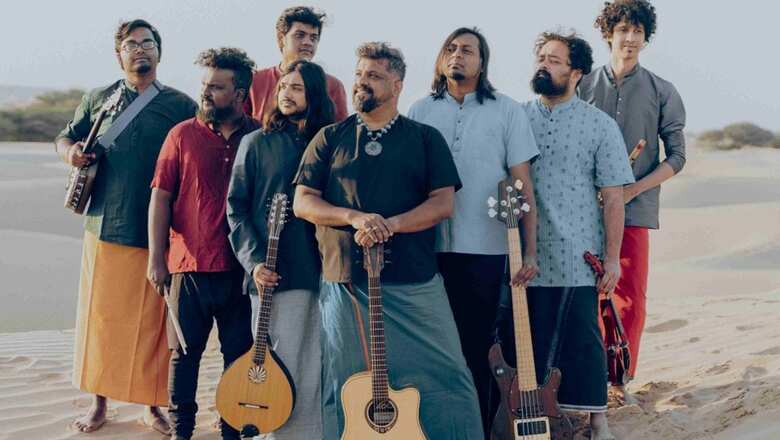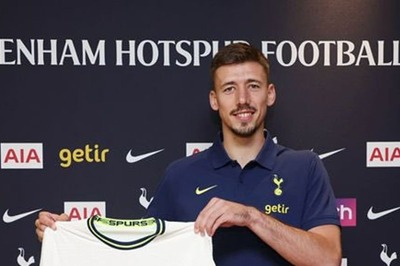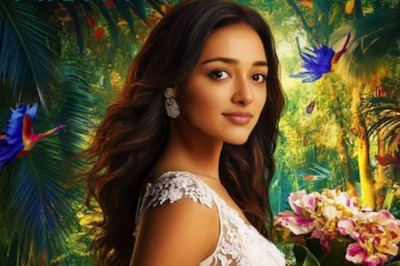
views
Indian singer-songwriter, producer, and composer of film scores, Raghu Dixit, also the frontman of the multilingual contemporary folk music group Raghu Dixit Project, talks about his experiences in independent and filmmaking music as well as the thrill of playing at Lollapalooza Mumbai.
Excerpts from the interview:
In order to appeal to a wide range of listeners, how do you, as the frontman of the Raghu Dixit Project, strike a balance between preserving the core of traditional folk music and adding modern elements?
I don’t know if I’m trying to reach a wider audience by doing what I do. It’s who I am. I grew up with all the cultures simultaneously, while I come from a very traditional family, growing up with the cultural values of a traditional family. I was exposed to modern music through college peers and friends. It was only natural that I brought the two worlds together. On one side, I was a Bharatanatyam dancer and at the same time, I was listening to modern music and artists like Bill Collins, George Michael, Michael Jackson and, of course, Pink Floyd, Metallica, etc. So it was only natural for me to, when I started playing, start playing on my own. I didn’t have any teachers as such. So there was nobody really telling me where to look for it, where I should head with it, what kind of music I should play or how I should play it. Or what is music really all about? I was a completely free-spirited person as far as music was concerned. I just brought the two worlds together naturally. It was not really an effort. And it worked for me. I’m happy with that.
Having worked in the Kannada film industry for a long time, what are the benefits and drawbacks of writing music for films as opposed to independent music?
I personally have not found any difficulty in coming to either of the fields. The only thing is that films have a mass appeal because their favourite actor is on the screen and it helps that they’re good-looking and they listen to the music that I come up with. Therefore, the songs became more popular. So, as far as mass reach is concerned, film music is a tool to be known. In fact, my album was out before my first film music name. But I guess it’s like a household name because of my first film in Kannada. It’s about expressing yourself creatively. The boundary of the script and then various other market demands, the producer’s pressure, the director’s taste in music or whatever he or she is looking for. And then there is the public persona and then there is very little of yourself in it. It’s a product of many people’s ideas. It’s not one’s prerogative to decide what the film’s song is.
Whereas independent music is truly independent in that sense, in its spirit, it comes straight to my heart and has no influence. I just think I should compose like this, like that or whatever. In the morning, either I’m in the loo or I’m writing. Suddenly, a tune comes up in my head and that’s the tune. It’s it. So, that way, making music for yourself is much more difficult; it also makes musicians lazy because you don’t have a deadline. So, you are forced to make music. Whereas, time to see, my previous album came 10 years ago. So, I will take my own sweet time for music to happen without any force.
You’ve worked on Bollywood projects and shared the stage alongside other great musicians. What perks does teamwork bring to your creative process, and are there any dream collaborations you’d love to work on?
A post shared by Raghu Dixit (@theraghudixitproject)
For instance, at Lollapalooza, I’m assembling a team of 30 individuals on stage, including a highly talented contemporary dance company from Bangalore and a folk dance team from the Agricultural University of Bangalore. Additionally, there are a couple of rural children studying agriculture at a university here in Bangalore who possess a natural ability for singing and dancing, showcasing their culture. They are choreographing a piece specifically for one of my songs. Drum dancers from Madhya Pradesh will also be part of the performance. Overall, it’s a visually appealing collaboration of musicians.
John Paul, the collaborator on my new album, will also be joining as a guest artist on stage. Pramath Kiran, a percussionist, is playing as well. Regarding your question, I’ve worked with exceptional musicians like Bela, who has played 17 times, and Manju, a player from Nashville, who featured on my album this year. Other collaborators include Hans Eriksson from Brazil, Kacey Greeson, a violinist from Nashville, playing on one of my songs, and Rajesh Vaidya, the Wiener player from China. Each song on this album features collaborations, and in the past, I’ve collaborated with similar artists on my albums.
You have dabbled in a variety of cinematic industries, such as Malayalam. How do you tweak your sound to accommodate different audiences’ tastes and regional quirks?
I haven’t encountered any difficulty bridging the language gap while working with various film directors and teams. I’ve worked in Malayalam, Telugu, Tamil, Kannada, and even Bollywood, and the process remains consistent. The key is to listen to the story, let the songs resonate, and make an impression on the producer, director, and eventually the audience. Occasionally, there’s a need for some clarifications to understand the producer’s exact requirements. However, overall, my journey has been smooth, and there has been no competition.
A post shared by Raghu Dixit (@theraghudixitproject)
Lollapalooza Mumbai is an esteemed venue. What does it feel like to be a part of a music event of this calibre, and what can fans expect from Raghu Dixit Project’s performance?
Excited like a child going ready to go to Disney Wonderland, but like I mentioned earlier, we are a 30+ team coming on stage. There are still dancers and there are visual artists who are performing with us in this venue. So it’s going to be a mix of visuals and all for the audience, which we ourselves have not experienced in a long time. We want to bring that back but with much more gusto and preparation this time.
What's your reaction?




















Comments
0 comment